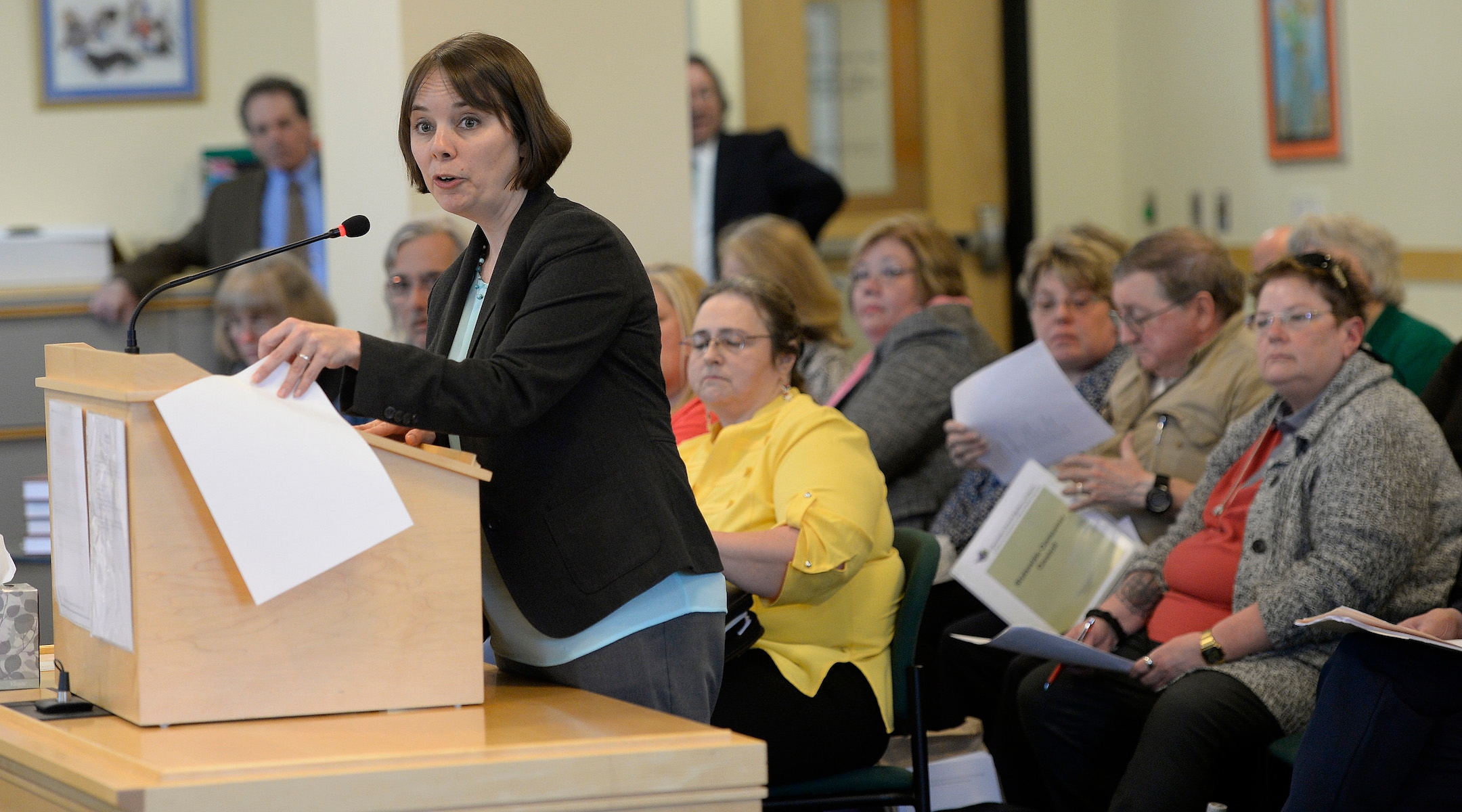Shenna Bellows, who blocked Trump from Maine’s primary ballot, used to run the state’s Holocaust center
In her decision, Maine’s first woman secretary of state echoed her own words about her work at the Holocaust center: that she was primarily concerned with protecting democracy

Shenna Bellows speaks at a hearing in Augusta, Maine, on May 2, 2017, while a Democratic state senator. Bellows would later become executive director of the Maine Holocaust and Human Rights Center and then, in 2020, the state’s Secretary of State. (Shawn Patrick Ouellette/Portland Portland Press Herald via Getty Images)
(JTA) – When Shenna Bellows was appointed Maine’s secretary of state in 2020, she described how her previous job at a Holocaust education center made her especially suited to the role.
Bellows, the former executive director of the Holocaust and Human Rights Center of Maine, tweeted that her work with Holocaust survivors “has taught me so much about how fragile and precious democracy is and about the importance of documenting and preserving our history to share with the future generations.”
Now, Bellows has issued what may be one of her state’s most consequential rulings in years: that former President Donald Trump is not eligible to appear on Maine’s primary ballot because his actions on Jan. 6, 2021 violated the U.S. Constitution’s 14th Amendment.
Unlike in Michigan and Colorado, where decisions on Trump’s ballot eligibility were recently made by those states’ Supreme Courts, Maine’s was made by Bellows alone — putting her, and perhaps her experience as a Holocaust educator, in the political spotlight for 2024.
In her decision, Bellows echoed her own words about her work at the Holocaust center: that she was primarily concerned with protecting democracy.
“I do not reach this conclusion lightly. Democracy is sacred,” she wrote in her Thursday decision ruling Trump ineligible. However, she stated, “The weight of the evidence makes clear that Mr. Trump was aware of the tinder laid by his multi-month effort to delegitimize a democratic election, and then chose to light a match.”
Bellows’ decision has been met with fury from Trump and his supporters. Shortly before she made the ruling, Trump’s legal team had argued she should recuse herself, claiming she was biased because she had already determined that the events of Jan. 6 constituted an insurrection. After the ruling, a Trump aide called Bellows a “virulent leftist,” while Trump himself, on his Truth Social platform, posted a link to the Maine secretary of state website.
Attempts to reach the center for comment were returned with an automated message that it is closed for the holidays.
A Democrat who served two terms in the Maine Senate, Bellows was the Maine Holocaust center’s director from 2018-2020, concurrently with her second term in the legislature. She left the position after the state legislature appointed her as Maine’s first female secretary of state. (Unlike in other states where the position is elected by voters, Maine’s is appointed by lawmakers.)
Her Trump decision made Maine the second state, after Colorado, to rule the former president ineligible for its primary ballot based on the Insurrection Clause. The move sets the stage for a highly consequential legal battle that will likely soon play out before the nation’s highest court. Trump’s team has appealed the Colorado decision to the Supreme Court, and Bellows said she recognized their decision could soon nullify her own.
Michigan’s Supreme Court has also separately ruled that Trump can stay on their state’s primary ballot, but that the door was still open for his removal from its general election ballot.
Previously, Bellows had been the head of the state’s chapter of the American Civil Liberties Union and founded a consulting firm for nonprofits. She ran as the Democratic nominee for U.S. Senate in 2014 against popular Republican Susan Collins and was soundly defeated, winning only 31% of the statewide vote.
Founded in 1985 by Holocaust survivor Gerda Haas, the Holocaust and Human Rights Center of Maine is located on the University of Maine’s campus in the state capital of Augusta. It focuses on education, offering courses to the state’s schools and programming guest speakers. An upcoming “Conversation on Antisemitism,” to be held in January, is advertised as focusing on “the antisemitism and hate that we are seeing as a result of the October 7th Hamas attacks in Israel and the war in Gaza,” while also noting, “We won’t be talking about the current war or the Israeli/Palestinian conflict in general.”
At the time Bellows was promoted to secretary of state, the museum’s leaders celebrated her time there. “The HHRC has thrived under Shenna’s leadership, especially in the areas of board development and grant writing,” Associate Director David Greenham said in a press release. Board member Nancy Spiegel added, “Her organizational and fiscal leadership skills have given us the ability to firmly weather this past year’s uncertainties. I am going to miss her but know she will be a strong and capable Secretary of State for Maine.”
Even after she left the center, Bellows has continued to advocate for Holocaust education and Jewish issues on social media, and she shared a recent story about Israeli hostages from Hamas’ Oct. 7 attacks.
This article originally appeared on JTA.org.













